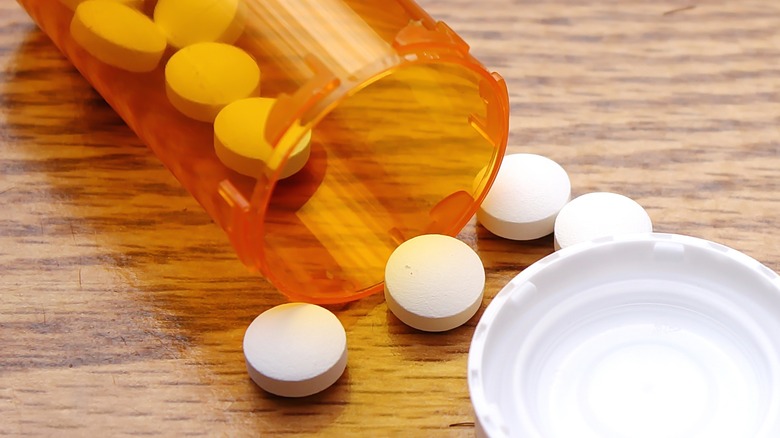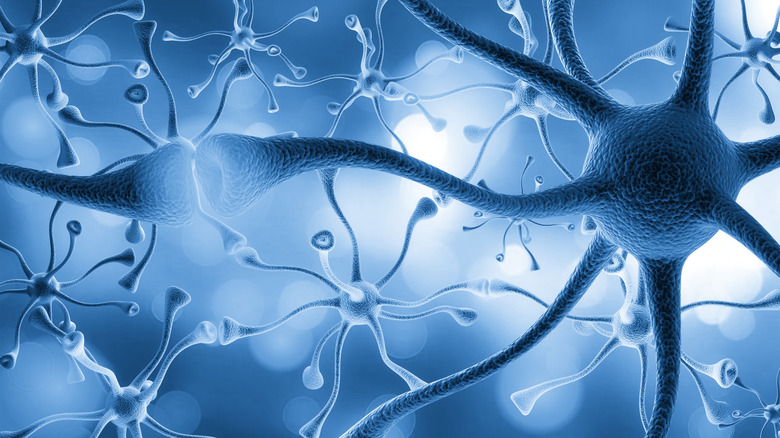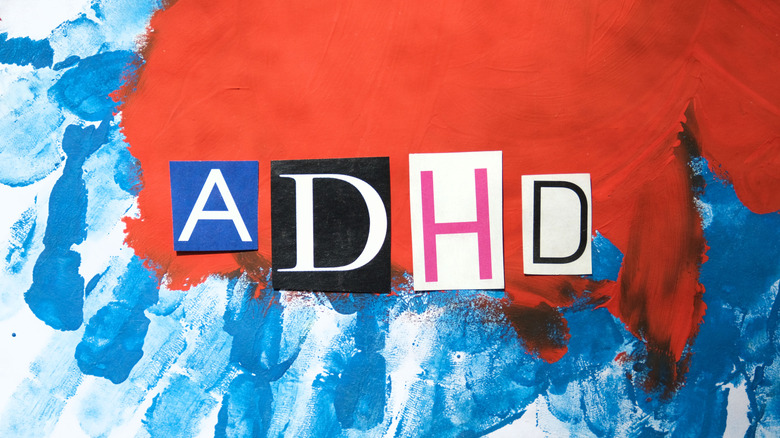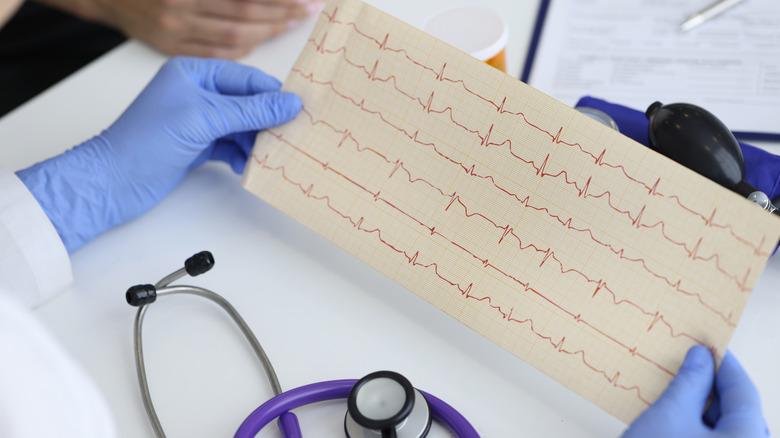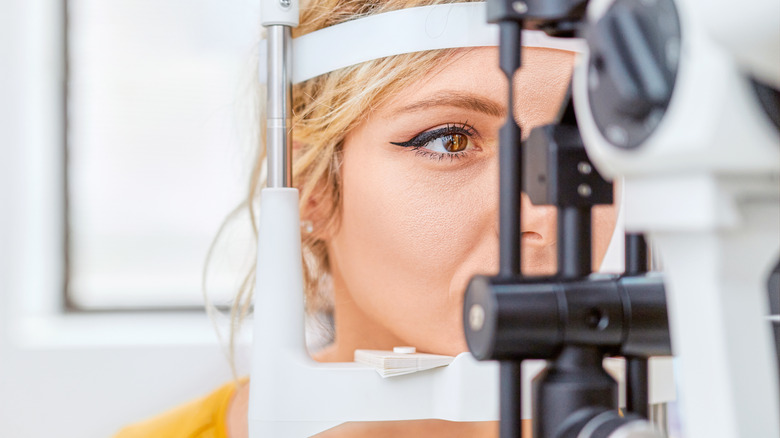Ritalin Explained: Usage, Dosage, And Side Effects
According to the Mayo Clinic, Ritalin is one of several different names for the central nervous system stimulant drug methylphenidate (MPH). In 1944, chemist Leandro Panizzon developed MPH to treat his wife Rita's low blood pressure. He named the drug after her and called it "Ritaline" (via The Specialist Forum). In 1954 doctors began using MPH under the name Ritalin to treat conditions like depression and chronic fatigue (via WebMD). However, Ritalin is best known for its role in management of attention deficit hyperactivity disorder (ADHD), and doctors still prescribe methylphenidate under various brand names more often than any other stimulant when they recommend medication for childhood ADHD.
Methylphenidate has uses beyond treating young people with ADHD. Clincalc.com indicates that in 2020, MPH ranked number 41 in the list of medications prescribed most often in the United States. That year, the number of prescriptions was estimated to be over 15 million, for an estimated 2.4 million patients. The website also states that the average out-of-pocket cost for MPH was $1.08 USD per day.
Methylphenidate is widely used, effective, and affordable for many people. However, there are side effects to consider, so if you're considering this medication for yourself or your child, preparing a list of question for your doctor is a good place to start.
How Ritalin works
Ritalin helps nerve impulses travel through synapses, from one nerve cell to the next. The National Cancer Institute describes synapses as spaces between nerve cells. When a nerve impulse reaches the end of a neuron (nerve cell), the neuron releases neurotransmitters that carry the nerve impulse through the synaptic space to the next cell.
Dopamine is an important neurotransmitter that performs this chemical messaging function across synapses. According to a study published in JAMA Psychiatry, methylphenidate (Ritalin) ensures there's enough dopamine for chemical messaging by blocking dopamine transporters (DATs). Molecular Brain explains that DATs clear dopamine out of each synapse by returning it to the source neuron, in a process called reuptake. Because methylphenidate blocks DAT action, it slows reuptake. Dopamine isn't the only neurotransmitter that methylphenidate influences. A review in Neuroscience and Biobehavioral Reviews describes a similar inhibitory effect on norepinephrine transporters (NETs). The result of this slowing of reuptake is an increased quantity of neurotransmitter levels in synapses to help with the transmission of nerve impulses.
The reason some people have low neurotransmitter levels can vary. For example, Medical News Today indicates that dietary saturated fat can cause inflammation that changes the dopamine system. Insufficient protein intake may also play a role since the amino acid l-tyrosine contributes to dopamine production. Patriot Direct Family Medicine cites genetics, chemicals, and the environment as other factors that can affect neurotransmitter production. Stimulant medication like Ritalin can compensate for these issues to increase neurotransmitter availability and treat certain conditions (per Healthline).
Ritalin as an ADHD treatment
A study published in JAMA Psychiatry indicates that Ritalin's active ingredient methylphenidate (MPH) is the drug clinicians prescribe most frequently when treating ADHD, and as many as 80% of children taking this medication may experience reductions in hyperactivity, impulsiveness, and inattention. However, HelpGuide cautions that Ritalin and stimulant medications like it aren't a cure for ADHD, but merely a treatment. Symptoms typically return when medication use stops.
According to JSTOR Daily, Ritalin was first approved for children in 1961 to treat "behavior problems," or a collection of symptoms later named attention deficit disorder (ADD) with the 1980 release of the diagnostic guide DSM-III from the American Psychiatric Association (APA). It wasn't until 1987 and the revised DSM-III that the condition Ritalin had been treating was given its current name of ADHD, or attention deficit hyperactivity disorder (via Healthline). It may seem counterintuitive to use a stimulant medication to treat a condition that includes hyperactive behavior, but as HelpGuide explains, the increase in dopamine from MPH is what gives the medication its calming effect.
Methylphenidate can also treat adult ADHD, as demonstrated in a meta-analysis published in Neuroscience & Biobehavioral Reviews. The authors found that adults with ADHD who took MPH scored higher than placebo controls on tests of driving ability and neurocognitive measures.
Ritalin for narcolepsy treatment
According to the National Institute of Neurological Disorders and Stroke (NINDS), narcolepsy is a lifelong neurological disorder affecting the brain's control over sleep-wake cycles. People who live with this condition experience excessive daytime sleepiness and may also wake frequently throughout the night. While most people take 60 to 90 minutes before they enter the sleep stage known as rapid eye movement (REM), people with narcolepsy enter REM sleep as quickly as 15 minutes after falling asleep. REM sleep typically includes dream activity and muscle weakness, but for people with narcolepsy, these states can occur during wakefulness. Narcolepsy symptoms can include cataplexy (sudden loss of muscle tone), sleep paralysis, hallucinations while falling asleep or waking up, insomnia, and brief daytime sleep episodes during which the person continues their actions but have no awareness or recollection of them. It's during daytime micro sleep episodes when people can encounter problems like car accidents, making narcolepsy treatment a high priority.
The Mayo Clinic states that methylphenidate is one of the medications doctors use to treat narcolepsy. MPH is a second-line treatment, because the central nervous system stimulant modafinil has fewer side effects and is less addictive, so doctors prescribe it first. However, if modafinil isn't effective, Ritalin may work to reduce excessive daytime sleepiness.
Ritalin as depression treatment
Methylphenidate (Ritalin) may ease symptoms in older, medically ill adults experiencing apathy, fatigue, or depression, according to a review published in The American Journal of Geriatric Pharmacotherapy. The review authors identified 19 controlled trials that featured the use of methylphenidate for older adults who were medically ill or in palliative care. Despite some inconsistencies among the trials, the study authors found enough evidence to suggest that low dose methylphenidate is worth trying to reduce depression, fatigue, and apathy symptoms in older adults facing serious or terminal health issues.
A 2015 study published in The American Journal of Psychiatry examined the combined effect of methylphenidate with citalopram (Celexa) to treat depression in older adults. The study participants all had a major depressive disorder diagnosis, and the mean age was 69 years. The study revealed that the combination of the two medications both accelerated treatment response and increased remission rate. Cognition also improved with treatment. Another study, this one published in the Annals of General Psychiatry in 2010, indicated that stimulant use combined with standard antidepressant medication may enhance and accelerate response in treatment-resistant depression.
Ritalin dosage
Too much Ritalin can lead to mental and physical dependence, cautions the Mayo Clinic, which is why it's important to take this medication as prescribed. Taking higher doses, or taking it more often or for longer than your doctor recommends, may cause Ritalin to become habit-forming. Since Ritalin's active ingredient methylphenidate comes in several different forms, the version you have will impact how you take it.
Clinicians often suggest taking short-acting methylphenidate two to three times per day, depending on your schedule. This is because the medication leaves your system sooner than for extended-release formulations. It's beneficial to take methylphenidate 30-45 minutes before meals so you're not as impacted by its appetite-suppressing effects.
Your doctor will prescribe your specific dose, monitor efficacy and side effects, and adjust as necessary. For children 6 years of age and older, the usual starting dose is 5 mg, to a maximum daily total of 60 mg. Adults can start at a higher dose, around 20 mg, but should also abide by the maximum daily amount of 60 mg. Extended-release versions have a higher starting dose for children at 17.3 mg, but are taken once per day. Your doctor may adjust these doses based on your specific situation, so it's important to take the medication as prescribed and communicate regularly about your progress and side effects.
Insomnia is a possible Ritalin side effect
Ritalin's active ingredient methylphenidate (MPH) can cause insomnia as a side effect. This effect may worsen as the dose increases and may have a greater impact on people with lower bodyweight, according to a study published in Journal of Developmental and Behavioral Pediatrics. However, the study also found that some participants with pre-existing sleep problems no longer had insomnia at the highest dose of methylphenidate. Despite this inconsistency, the study authors found that when MPH did interfere with sleep, there was a clear connection with dose increases: Sleep problems occurred in 15-18% of the subjects taking low and medium doses of MPH, and rose to 25% at a high dose.
Frontiers in Psychiatry published a study that showed different results. Study participants experienced better sleep while undergoing MPH treatment at week eight of the study and afterward. The study authors theorized that since previous studies showing sleep interruption from MPH were conducted between one and seven weeks, the positive influence on sleep from their study may be linked to the duration of MPH use: When the medication is used for longer periods of time, sleep efficiency may improve for some people.
ADDitude suggests adjusting medication dosage or timing to help ease insomnia from MPH, although you should discuss any changes with your doctor first (via the Mayo Clinic). ADDitude also suggests adding the sleep hormone melatonin to your regimen, as well as improving your sleep hygiene. If none of these strategies work, your doctor may recommend trying another medication instead of Ritalin.
Ritalin may suppress appetite and cause weight loss
Stimulant medications like methylphenidate (Ritalin) may suppress appetite and lead to weight loss. Researchers theorize that methylphenidate's appetite dysregulation effect is because when it activates the insular lobe this stimulates a disgust sensation (via L'Encephale). In some cases, doctors use the appetite-suppressant effect of stimulant medication to treat binge eating disorder, as described in a case study published in Psychiatric and Clinical Psychopharmacology. However, if a child takes methylphenidate (Ritalin) to treat ADHD, it may interfere with their growth if they aren't able to eat as much as they should. Healthline indicates that some doctors suggest a medication break over the summer months to counteract the slowed growth that some children experience.
In some cases, this stimulant-related appetite loss may not last. The review published in L'Encephale found evidence that appetite reduction and accompanying weight loss may last three to six months in some children and adolescents, after which time they begin catching up to their non-medicated peers.
For those who continue experiencing a lack of interest in food, ADDitude suggests several strategies for obtaining adequate nutrition, one of which is preparing nutrient and calorie-dense breakfasts served before the day's first methylphenidate dose takes affect. Add calorie-rich sauces like melted cheese to vegetable side-dishes. Prepare for unpredictable moments of hunger by stocking up on convenient snacks such as nuts, yogurt, and cheese.
Ritalin may increase anxiety
RxList mentions anxiety as a common side effect of Ritalin, while MedlinePlus includes anxiety in its list of overdose warning signs for Ritalin's active ingredient methylphenidate (MPH). At any dose, taking this stimulant medication might make you anxious. Paradoxically, animal and human models show that acute administration of MPH can reduce anxiety in adults, according to a review published in Revista de Neurologia. The authors of a meta-analysis published in the Journal of Child and Adolescent Psychopharmacology examining childhood ADHD treatment theorize that when MPH reduces anxiety, it's because of the way it eases ADHD symptoms, not because of a direct effect of the medication on nervousness. The Revista de Neurologia review also indicates that regular MPH treatment at a young age can result in higher adult anxiety.
Even one dose of Ritalin may trigger nervousness, although it might not be immediately evident. A study published in Frontiers in Behavioral Neuroscience found evidence to suggest that there could be a slight delay in anxiety onset after a single dose of methylphenidate, which can lead to medication non-adherence. There was no initial difference in anxiety levels between participants who'd received MPH versus a placebo, but in the second study session, those who'd previously taken MPH exhibited more anxiety than placebo controls.
Ritalin may cause cardiovascular complications
According to the American College of Cardiology, stimulant medications come with warnings that people with cardiac structural abnormalities or existing heart disease should avoid medications like Ritalin that contain methylphenidate (MPH). For people with these conditions, risks from using stimulants include stroke, myocardial infarction, and sudden death. A 2011 safety announcement from the Food and Drug Administration (FDA) warns people with heart problems, or who need to avoid increases in blood pressure or heart rate, against the use of medications like stimulants and atomoxetine.
Older adults should approach methylphenidate use with caution. A 2021 study in JAMA Network Open found that adults aged 66 and over who started taking MPH experienced a 40% increase in cardiac events within the first 30 days of medication use. This risk decreased over time, down to zero at 180 days. The early period of methylphenidate treatment is also risky for children, according to a study published in The Pharmaceutical Journal that found the risk of arrhythmias to be 61% higher while taking MPH, which peaked in the first three days of treatment. Children with congenital heart disease had a higher risk.
Stimulant medication can be safe with proper screening first. Doctors can review family history and perform an EKG to assess cardiac risk before prescribing methylphenidate (via Psych Central).
Ritalin may cause dizziness or headaches
According to the Mayo Clinic, Ritalin's active ingredient methylphenidate (MPH) may cause dizziness. WebMD indicates that this side effect may occur because your MPH dose is too high. Dizziness is a symptom you should report to your doctor, who might want to check your blood pressure. Medical News Today mentions that taking methylphenidate on an empty stomach might be the cause of dizziness for some people, so if this is your experience, then taking your medication with food may help reduce your symptoms.
Headaches are another possible side effect of methylphenidate. A 2021 review in Psychological Medicine found that headaches are frequently comorbid with ADHD, and often a side effect of stimulant medication. The review found that long-acting methylphenidate was associated with a higher risk of headache than controls. WebMD cautions that taking MPH on an empty stomach can cause headaches, as can dehydration. Sometimes headaches occur as your medication dose wears off as well.
Ritalin may cause gastrointestinal issues
Nausea, loss of appetite, diarrhea, and abdominal pain are the most common adverse gastrointestinal (GI) events reported as side effects of methylphenidate (Ritalin) use, according to a meta-analysis published in PLoS One. Some studies suggest changing medications if you or your child experience these types of unwanted GI reactions while taking Ritalin. Before changing, your doctor might suggest lowering your dose to see if this alleviates symptoms.
There's research indicating that people who live with ADHD might also experience more gastrointestinal issues regardless of whether they take medication. A study published in the World Journal of Gastroenterology found a connection between an excess of functional gastrointestinal disorders and ADHD in young adults. The issues the study participants reported included upset stomach, chronic constipation, and irritable bowel syndrome. However, there wasn't a connection between this group and celiac disease or inflammatory bowel disease. Consistent with other evidence citing Ritalin as a trigger for stomach upset, the study found that the existing problems of stomach pain and constipation were more likely to occur during methylphenidate treatment.
Ritalin may cause mood changes
Considering some of the other side effects of Ritalin's active ingredient methylphenidate (MPH), it's no wonder that moodiness might be among them. If a person taking MPH experiences the effects WebMD lists like insomnia, gastrointestinal upset, or headaches, it's understandable that these might impact mood. However, mood changes can also be a stand-alone side effect of a stimulant like Ritalin. According to the Child Mind Institute, about one in 25 children who take stimulant medication experience irritability and moodiness during the course of treatment, and those mood changes end as soon as the medication is discontinued. The FDA adds aggression and hostility to the list of temperament disruptions that can occur during methylphenidate treatment.
ADDitude cautions that mood and behavior changes including spaciness, irritability, and tearfulness could be a sign that your child's dose of MPH is too high. Your doctor may recommend lowering the dose to see if there's an improvement. If a dose low enough to alleviate mood changes no longer manages the unwanted symptoms of ADHD, your doctor might suggest trying a non-stimulant medication.
A study published in The American Journal of Psychiatry indicates that people who live with comorbid ADHD and bipolar disorder may experience mania from MPH monotherapy (therapy with one medication). However, the risk of mania went down for participants on mood stabilizer medication once they added MPH to their regimen. The study authors recommend a careful assessment to rule out bipolar disorder and the chance of mania occurring before prescribing Ritalin on its own.
Ritalin is linked to circulation problems
Ritalin may interfere with circulation and cause symptoms like pain, coldness, numbness, skin color changes, or unexplained wounds, according to RxList. Your fingers and toes may look blue or red if you're experiencing this circulatory side effect. The FDA links Ritalin's active ingredient methylphenidate (MPH) to peripheral vasculopathy such as Raynaud's. The FDA indicates that symptoms are usually mild and sporadic, but in rare cases can include soft tissue breakdown and sores on fingers and toes.
Vasculopathy is any type of disease affecting blood vessels (via Diffusion-Weighted MR Imaging of the Brain). Johns Hopkins Medicine describes peripheral as being any blood vessel located outside of the heart, and explains that while peripheral vascular disease (PVD) can occur in organs like your brain, it affects the legs and feet most often. PVD is a circulation disorder where blood vessels become narrowed or blocked, preventing blood flow.
According to the Mayo Clinic, Raynaud's is a condition in which the blood vessels in certain areas of your body experience vasospasm, which means narrowing enough to limit blood flow. Fingers and toes are a common site for Raynaud's vasospasm, which is typically triggered by stress or cold temperatures. The FDA states that Raynaud's symptoms generally fade with a lower dose or discontinuation of MPH, and they recommend monitoring for digital changes during treatment.
Ritalin may cause vision problems
Stimulant medications like Ritalin can affect eyesight. Authors of a case study published in Paediatrics & Child Health list dry eyes, mydriasis (dilation), blurry vision, and accommodation disturbance (trouble maintaining focus) as possible vision side effects from stimulant medication. The case study recounted the experience of a 9-year-old boy with ADHD treated with Biphentin, a stimulant medication containing Ritalin's active ingredient methylphenidate. While taking the methylphenidate, he experienced difficulties seeing objects near or far. He stopped taking the medication, and within a week his vision was back to normal.
People who live with glaucoma should not take Ritalin or other stimulant medications. Drugs.com states that stimulant medication can sometimes induce mydriasis, and occasionally increase pressure inside the eye. Johns Hopkins Medicine explains that glaucoma causes progressive damage to the optic nerve, and eye pressure is a significant contributing factor to this damage. Glaucoma causes irreversible blindness, and eye pressure is the only currently known risk factor that doctors can modify. Avoiding stimulant medication is a precaution you can take if you have glaucoma or are at risk for developing this condition.

